Minister visits CBS: “Higher education policy has been hijacked by immigration policy agendas. I would like to turn that around.”
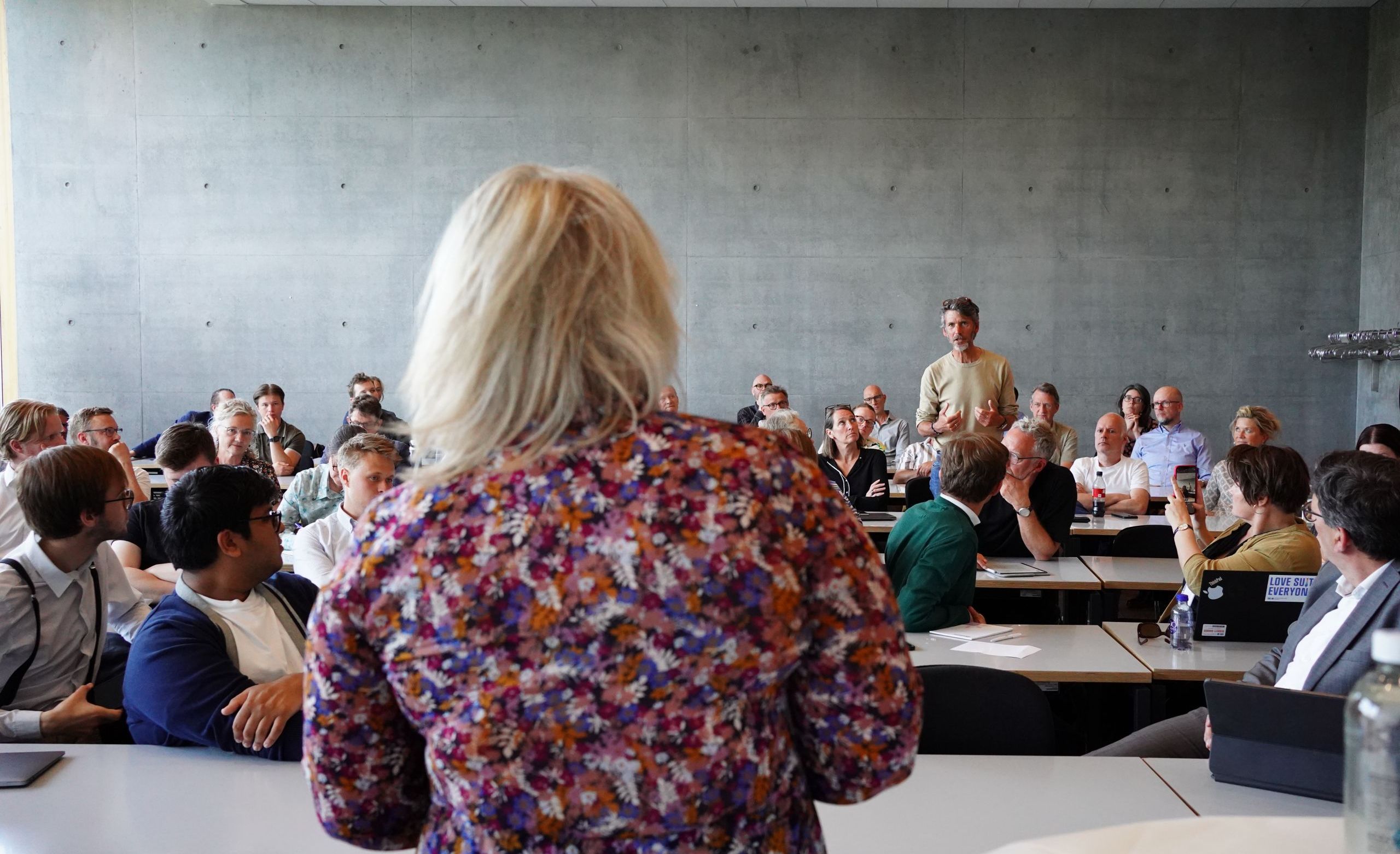
Photo: Jonas Rohold/CBS
Stakeholders from CBS voiced their concerns and questions when the Minister for Higher Education and Science Christina Egelund visited CBS on Monday as part of her tour of Danish universities before negotiations for the university reform are finalised. The minister hopes for more international students, a fresh start to lifelong learning partnerships – and an end to hijacking the education policy.
At Kilen, the minister welcomed an invited audience of more than 50 people representing students, faculty and administrative staff – to an hour-long session – in both Danish and English.
Since the reform was presented in March, the government minister Christina Egelund from the party Moderaterne (The Moderates) acknowledged that the comprehensive university reform proposal was not very popular and had stirred up a lot of debate.
“We have been politically negotiating the proposal for two months – especially the master’s programmes. It is very complex, with many different considerations.”
Negotiations between political parties are continuing while the minister is touring the Danish universities to listen to the concerns raised. This will impact on the final solution, she clarified, which she hopes will be reached before the summer holidays.
The ambition is to carve out a reform which a parliamentary majority spanning more than the government parties as after its adoption, a long period for development and implementation will be required. “That deserves a stable, political majority, ” she said, adding that a reform with multiple voices and ‘fathers’ will be more nuanced.
Three goals
She listed the government’s three goals for the university reform:
1) More business-oriented
2) Flexibility and lifelong learning
3) International aim
Christina Egelund said that, for many years, higher education policy has been hijacked by the immigration policy and other agendas that have little to do with higher education. As a result, the number of international students and English-language programmes in Denmark has been gradually reduced.
“I would like to turn that around. We are suggesting a considerable increase in both, so Denmark will again make its mark on the international stage. There is a mutuality in this – as we can send off more Danish students abroad.”
The minister, who has been an international student in Paris herself and has lived with her French partner for 24 years, has been personally annoyed about this long-term scaling down, she said.
“We need a massive increase in international students.”
Why cut social sciences most?
The first question came from Kristian Miltersen, programme manager and chair of the Academic Council:
“As I understand this plan, the premise is that the arrow is now pointing more towards social sciences. Why is that? Is it because 1) we are now less efficient at educating students, so we can do it in four years instead of five or because 2) we are teaching students things today that they don’t need in the future, so we can cut that out? Or a third explanation?”
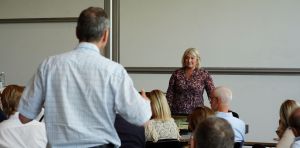
An invited audience asked questions to the Minister for Higher Education and Science on 22 May. Photo: Jonas Rohold/CBS
Christina Engelund: “I have tried to speak against bashing the humanities, which has been going on for years. We have not yet set in stone how much will be redistributed in the main academic areas, (i.e. natural sciences, social sciences and the humanities, ed). And I don’t think it will be very specific in a political framework agreement. There is a good reason why we politicians should know our place and competencies and those of others.
“When Nina Schmidt (head of the Reform Commission, ed.) originally suggested social sciences and the humanities should be reformed most, it was an economic approach because this is where the increase in admissions has been greatest.”
The more ‘condensed’ programmes leading to an authorisation such as in the healthcare professions could not be touched in the minister’s opinion.
Lack of a logical solution
Nanna Mik-Meyer, professor and Chair of the Professors’ Association, continued in this vein, questioning the logic of the reform: CBS is doing well on all levels, running smoothly. Why this, now?
“You say to us, that the main reason social sciences have to carry more weight than humanities is that we have had this influx of students. That does not fit very well with the solution. One-year master’s will not reduce the student intake, that is just going to shorten their education and maybe lower the quality. If the main problem is, as Nina Schmidt was pointing at, that we have seen enormous growth, the logical solution would be to reduce the number of students entering? It’s unclear now, how shortening degrees will solve this problem and why primarily social sciences degrees should be shortened.”
The Minister replied: “I do agree that CBS is doing terrifically. And if the platform is not on fire, why fix it? But I have never said I want fewer people to take university degrees. Others have said that, they would have to explain for themselves. The reform we presented in March is not about cutting the number of academic students, but softening the structure and making it more flexible, and actually delivering on lifelong learning. Others have suggested cutting the student intake. It’s on the negotiating table in the political process right now. That has been suggested by eight of the other political parties and by Universities Denmark. But I agree that’s an answer to a totally different question.”
Lifelong learning requires a new mindset
Rasmus Johnsen, Vice Dean for Lifelong Learning, asked which political initiatives would be the foundation for the mindset change needed in workplaces to allow people to get the training and resources necessary. Does this involve user fees or the option of returning to state grants?
The minister’s reply: “We have imagined different regimes and have even allocated money to fund some returning as regular full-time students with state grants.”
In reality, because life situations and economic obligations change, the minister imagines that a more likely scenario will be that people return to take modules while they are working rather than returning as full-time students.
“This demands something of universities and workplaces alike. Universities should be flexible and not only offer courses on Mondays at 11, when workplace meetings tend to take place. I believe the universities will not have a problem with that and are happy to do it. The real barrier is the mindset change of employers, both in the public and private sectors. I have worked in a private company once; if an employee asked for every Friday off to attend university, any employer will answer: ‘It’s a great idea, we want well-educated employees, but it will not work for the next six months. Something else will be more important to do first.
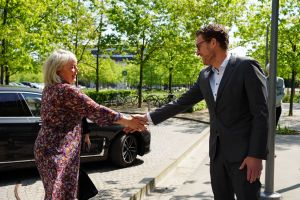
President Nikolaj Malchow-Møller welcomes the minister Christina Egelund to CBS. Photo: Jonas Rohold/CBS
“It needs to be OK for an employee to take some time out for university. I can’t tell you exactly how it will actually work in practice. But in our conversations with especially the private sector, they know very well that this will require flexibility. And they want to partner with us and the universities to build programmes. I don’t foresee user fees for courses. I imagine we will finance this.”
The minister also spoke about establishing a more structured framework for corporate graduates (part-time master’s) – a programme that has never quite caught on – now making up only two percent of master’s degrees:
“We want a joint venture model,” she explained. “A faculty reaching an agreement with a larger corporation to provide corporate graduate programmes. This will be on fixed terms and the responsibility is not on the student’s shoulders to find the company. We will facilitate that.”
What about the students?
Several audience members expressed concerns that a one-year master’s would squeeze more into less time, causing worse problems with student deadlines and mental health, while also endangering the popular exchange semesters and internships in their current form.
Taking his cue from the minister’s remarks on internationalisation, and speaking on behalf of the international students, Jan Smolinski, Executive Officer at CBS Students, asked if the minister had planned initiatives to make the increasing number of international students feel more welcome and included in order to stay and work in Denmark after graduating.
“With this reform, we want to open our doors and talk about the positive aspects, the gift of cultural exchange. I hope we can initiate transformation,” Christina Egelund said.
Denmark scores high on material and safety aspects, the minister finds, but it is harder than it perhaps should be to find friends, socialise etc.
“But we can’t really regulate that. I can’t pass a law telling Danes to be more friendly. But I do hope you feel welcome.”


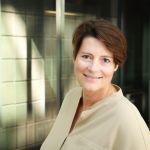

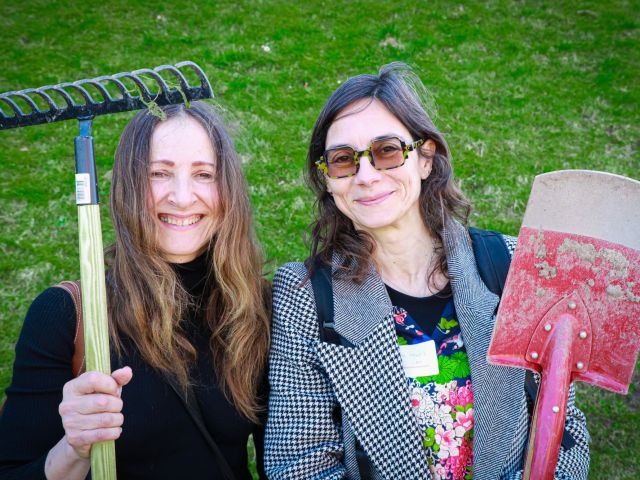




























































































































Comments